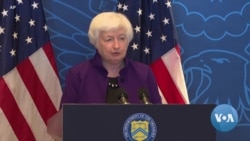ລັດຖະມົນຕີກະຊວງການເງິນຂອງສະຫະລັດ ໃນວັນອາທິດແລ້ວນີ້ ໄດ້ສໍາເລັດການຢ້ຽມຢາມຈີນ ເປັນເວລາ 4 ມື້ ຂອງທ່ານນາງ. ການຢ້ຽມຢາມດັ່ງ ກ່າວນີ້ ແມ່ນມີເປົ້າໝາຍເພື່ອຫຼຸດຜ່ອນຄວາມເຄັ່ງຕຶງລະຫວ່າງປະເທດທັງສອງ ໃນຂະນະທີ່ຄວາມສໍາພັນ ໄດ້ກ້າວເຂົ້າສູ່ພາວະທີ່ຊຸດໂຊມລົງໃນຊ່ວງບໍ່ເທົ່າໃດປີທີ່ຜ່ານມາ. ທັງສອງປະເທດ ໄດ້ຫາລືກ່ຽວກັບເສດຖະກິດ, ບາລລູນສອດແນມ ແລະບັນຫາການປ່ຽນແປງຂອງສະພາບອາກາດ, ແຕ່ວ່າ ແມ່ນຫຍັງເກີດຂຶ້ນຫຼັງຈາກນັ້ນ? ອາຣາສ ອາຣາບາຊາດີ (Arash Arabasadi) ນັກຂ່າວ VOA ມີລາຍງານເພີ້ມເຕີມ ກ່ຽວກັບເລື້ອງນີ້, ເຊິ່ງ ທິບສຸດາ ຈະນໍາເອົາລາຍລະອຽດມາ ສະເໜີທ່ານ ໃນອັນດັບຕໍ່ໄປ.
ເຫດການຢູ່ໃນຊ່ອງແຄບໄຕ້ຫວັນເມື່ອບໍ່ດົນມານີ້ ໂດຍກໍາປັ່ນລົບຂອງຈີນ ແລ່ນຜ່ານກໍາປັ່ນພິຄາດຂອງກອງທັບເຮືອສະຫະລັດ ໃນອັນທີ່ສະຫະລັດຮ້ອງວ່າ ເປັນ “ພຶດຕິກໍາທີ່ບໍ່ປອດໄພ” ນັ້ນ ໄດ້ເນັ້ນຢໍ້າເຖິງຄວາມເຄັ່ງຕຶງລະຫວ່າງສອງປະເທດມະຫາອໍານາດທີ່ໃຫຍ່ທີ່ສຸດໃນໂລກ.
ຍ້ອນເລື້ອງດັ່ງກ່າວ ລັດຖະມົນຕີກະຊວງການເງິນ ທ່ານນາງເຈເນັດ ແຢລເລັນ ຈຶ່ງເດີນທາງໄປຢ້ຽມຢາມຈີນໃນທ້າຍອາທິດແລ້ວນີ້. ໃນນະຄອນຫຼວງປັກກິ່ງ ທ່ານນາງພົບປະກັບເຈົ້າໜ້າທີ່ຫຼາຍໆທ່ານຂອງຈີນ ເພື່ອປຶກສາຫາລືກ່ຽວກັບບັນ ຫາຕ່າງໆນັບແຕ່ເລື້ອງການຄ້າ, ສະພາບແວດລ້ອມ ແລະການສອດແນມ. ເບິ່ງຄືວ່າ ການດໍາເນີນງານມີຄວາມກ້າວໜ້າ, ແຕ່ ທ່ານນາງແຢລເລັນ ກ່າວວ່າ ທັງສອງປະເທດ ຍັງຄົງຈະຕ້ອງດໍາເນີນການເພີ້ມຕື່ມ.
ທ່ານນາງເຈເນັດ ແຢລເລັນ, ລັດຖະມົນຕີກະຊວງການເງິນຂອງສະຫະລັດ ກ່າວຖະແຫຼງທີ່ນະຄອນຫຼວງປັກກິ່ງ ເຊິ່ງໄດ້ຮັບການສະໜອງຈາກອົງການຂ່າວ AP ວ່າ:
“ສະຫະລັດ ແລະຈີນ ມີຄວາມຂັດແຍ້ງຕ່າງໆທີ່ສໍາຄັນ. ຄວາມຂັດແຍ້ງເຫຼົ່ານັ້ນ ຈໍາເປັນຕ້ອງມີການໂອ້ລົມສື່ສານຢ່າງແຈ່ມແຈ້ງ ແລະກົງໄປກົງມາ. ແຕ່ປະທາ ນາທິບໍດີ ໂຈ ໄບເດັນ ແລະ ຂ້າພະເຈົ້າ ບໍ່ປາກົດເຫັນການພົວພັນ ລະຫວ່າງ ສະຫະລັດ ແລະ ຈີນ ຜ່ານຂອບຂອງຄວາມຂັດແຍ້ງມະຫາອໍານາດ. ພວກເຮົາມີຄວາມເຊື່ອວ່າ ໂລກມີຄວາມກວ້າງໃຫຍ່ພຽງພໍ ເພື່ອຄວາມຈະເລີນກ້າວໜ້າສໍາລັບປະເທດທັງສອງຂອງພວກເຮົາ.”
ການເດີນທາງໄປຢ້ຽມຢາມຂອງ ທ່ານນາງແຢລເລັນ ມີຂຶ້ນເນື່ອງຈາກເຫດການບາລລູນສອດແນມຂອງຈີນໃນຊ່ວງຕົ້ນປີນີ້ ເຊິ່ງໄດ້ລ່ອງລອຍ ຢູ່ໃນລະດັບສູງເຂົ້າມາໃນນ່ານຟ້າຂອງ ສະຫະລັດ ແລະ ການາດາ. ໃນທີ່ສຸດ, ສະຫະລັດ ກໍໄດ້ຍິງບາລລູນດັ່ງກ່າວຕົກ, ແລະລັດຖະບານຈີນ ກໍໄດ້ຮ້ອງການກະທໍາດັ່ງກ່າວນັ້ນວ່າ “ເປັນການກະທໍາທີ່ເກີນເຫດຜົນ.”
ຫົວຂໍ້ການສົນທະນາຫາລື ຖືກນໍາຂຶ້ນມາໂອ້ລົມໂດຍຮອງນາຍົກລັດຖະມົນຕີຄົນ ໃໝ່ຂອງຈີນ ທ່ານຮູ ລີຟົງ (Huh le-Fong) ໃນການປະຊຸມກັບທ່ານນາງແຢລເລັນ ເມື່ອອາທິດແລ້ວນີ້.
ເຊິ່ງການຖະແຫຼງຂອງທ່ານລີຟົງ ທີ່ສະໜອງໃຫ້ໂດຍອົງການຂ່າວ AP ກ່າວວ່າ:
“ເປັນເລື້ອງທີ່ໜ້າເສົ້າໃຈທີ່ມີເຫດການບໍ່ຄາດຄິດເກີດຂຶ້ນຫຼາຍໆຄັ້ງ ເຊັ່ນວ່າ: ບາລລູນທີ່ລອຍຢູ່ເທິງອາກາດໂດຍໃຊ້ອາຍແກັສ, ຄວາມສໍາພັນລະຫວ່າງ ຈີນ ແລະ ສະຫະລັດ ມີຄວາມຫຍຸ້ງຍາກຫຼາຍຂຶ້ນ ໂດຍສະເພາະ ໃນດ້ານການດໍາເນີນງານທີ່ບໍ່ສອດຄ່ອງກັນຂອງຜູ້ນໍາທັງສອງປະເທດ...ພວກເຮົາປາຖະໜາວ່າ ທາງຝ່າຍສະຫະລັດ ຈະນໍາໃຊ້ເຫດຜົນ ແລະທັດສະນະທີ່ແທ້ຈິງ ເພື່ອພົບກັນກັບຝ່າຍ ຈີນ ເຄິ່ງທາງ...ແລະໃຫ້ການຢືນຢັນໃນທາງບວກ ເຂົ້າໃນການດໍາເນີນງານ ເພື່ອຟື້ນຟູຄວາມສໍາພັນ ແລະສະຖຽນລະພາບຂອງ ສະຫະລັດ ແລະ ຈີນ.”
ທ່ານນາງແຢລເລັນ ຍັງໄດ້ພົບປະ ເພື່ອເຈລະຈາຫາລືໃນອັນທີ່ທ່ານນາງຮ້ອງວ່າ “ການຕິດຕໍ່ສື່ສານທີ່ຊື່ສັດ” ໂດຍສະເພາະແມ່ນ ບັນຫາຕ່າງໆກ່ຽວກັບສະ ພາບອາກາດ.
ອີກຄັ້ງນຶ່ງ, ທ່ານນາງແຢລເລັນ ໄດ້ຖະແຫຼງຢູ່ປັກກິ່ງ ທີ່ໄດ້ຮັບການສະໜອງໃຫ້ໂດຍອົງການຂ່າວ AP ວ່າ:
“ໃນຖານະສອງປະເທດທີ່ມີລະບົບເສດຖະກິດໃຫຍ່ທີ່ສຸດໃນໂລກ ມັນຢູ່ໃນຜົນປະໂຫຍດຂອງພວກເຮົາທັງສອງທີ່ຈະດໍາເນີນງານຮ່ວມກັນ ກ່ຽວກັບຄວາມທ້າທາຍຕ່າງໆເຫຼົ່ານີ້. ແລະນັ້ນ ເປັນບາງຢ່າງທີ່ທົ່ວໂລກມີຄວາມຄາດຫວັງນໍາພວກເຮົາ, ພ້ອມກັນນນັ້ນ ການປ່ຽນແປງຂອງສະພາບອາກາດ ກໍແມ່ນບັນຫາສໍາຄັນທີ່ສຸດຕໍ່ຄວາມທ້າທາຍຢູ່ໃນໂລກ, ເຊິ່ງ ສະຫະລັດ ແລະ ຈີນ ຕ້ອງເຮັດວຽກຮ່ວມກັນ ເພື່ອຮັບມືກັບໄພຄຸກຄາມທີ່ມີຢູ່ນີ້.”
ໃນລະຫວ່າງທີ່ການຜ່ານຜ່າອຸປະສັກຂະໜາດໃຫຍ່ທາງດ້ານການທູດ ບໍ່ໄດ້ຮັບການຄາດການໂດຍທັງສອງປະເທດ, ການຢ້ຽມຢາມຂອງ ທ່ານນາງແຢລເລັນ ເກີດຂຶ້ນທ່າມກາງຄວາມສໍາພັນ ຢູ່ໃນຊ່ວງເວລາທີ່ມີຄວາມສັບສົນວຸ້ນວາຍທີ່ສຸດ. ໜັງສືພິມ The Wall Street Journal ລາຍງານໃນເດືອນແລ້ວນີ້ວ່າ ຈີນ ໄດ້ບັນລຸຂໍ້ຕົກລົງລັບກັບຄິວບາ ເພື່ອສ້າງສະຖານີການດັກຟັງທາງດ້ານອີເລັກໂທຣນິກ ກ່ຽວກັບການຮວບຮວມຂໍ້ມູນຂ່າວສານຈາກພາກຕາເວັນອອກສຽງໃຕ້ຂອງສະຫະລັດ.
ອີກບັນຫານຶ່ງມໍ່ໆມານີ້ ແມ່ນເວລາປະທານາທິບໍດີຂອງສະຫະລັດ ທ່ານໂຈ ໄບເດັນ ຮ້ອງປະທານປະເທດຈີນ ທ່ານສີ ຈິ້ນຜິງ ວ່າ ເປັນຜູ້ຜະເດັດການ.
The U.S. Treasury Secretary on Sunday finished a four-day trip to China. The visit aimed to ease tensions between the two countries as the relationship had taken a downturn in recent years. The two sides talked economics, a spy balloon, and climate change, but what came out of it? VOA’s Arash Arabasadi has more.
A recent maneuver in the Taiwan Strait by a Chinese warship passing a U.S. Navy destroyer in what the United States called an “unsafe manner” highlighted the tensions between the world’s largest superpowers.
It was against this backdrop that U.S. Treasury Secretary Janet Yellen visited the Chinese capital late last week. In Beijing she met with parties to discuss issues ranging from trade, the environment, and spying. There appears to have been some progress, but Yellen said the two countries still have a way to go.
U.S. Treasury Secretary Janet Yellen speaking in Beijing as provided by The Associated Press.
“The U.S. and China have significant disagreements. Those disagreements need to be communicated clearly and directly. But President [Joe] Biden and I do not see the relationship between the U.S. and China through the frame of great power conflict. We believe that the world is big enough for both of our countries to thrive.”
Yellen’s trip follows the Chinese spy balloon incident from earlier this year where a high-altitude balloon traveled much of the United States and Canada. The U.S. ultimately shot down the craft, and the Chinese government called that an “excessive reaction.”
A topic of discussion brought up by new Chinese Vice Premier He Lifeng ((Huh le-Fong)) at a meeting last week with Yellen.
Chinese Vice Premier He Lifeng as provided by the Associated Press.
“It is regretful that due to a series of unexpected incidents, such as the airship, the China-U.S. relations has had some difficulties, particularly in implementing the consensus of the two state leaders… We wish the U.S. side would take a rational and practical attitude, meet with the Chinese side halfway… and put positive remarks into actions so as to stabilize and improve China-U.S. relations.”
Yellen also met to discuss what she called “honest lines of communication” particularly around climate issues.
Treasury Secretary Janet Yellen again speaking from Beijing as provided by The Associated Press.
“As the two largest economies in the world it’s in our interests to work together on these challenges. And that’s something the world expects of us. And climate change is on the top of the list of global challenges. And the United States and China must work together to address this existential threat.”
While a major diplomatic breakthrough wasn’t expected by either country, Yellen’s visit came amid a particularly turbulent time in relations. The Wall Street Journal reported last month that China had reached a secret deal with Cuba to establish an electronic eavesdropping station capable of gathering information from the southeastern United States.
Furthering compounding issues recently was when U.S. President Joe Biden called Chinese President Xi Jinping a dictator.





